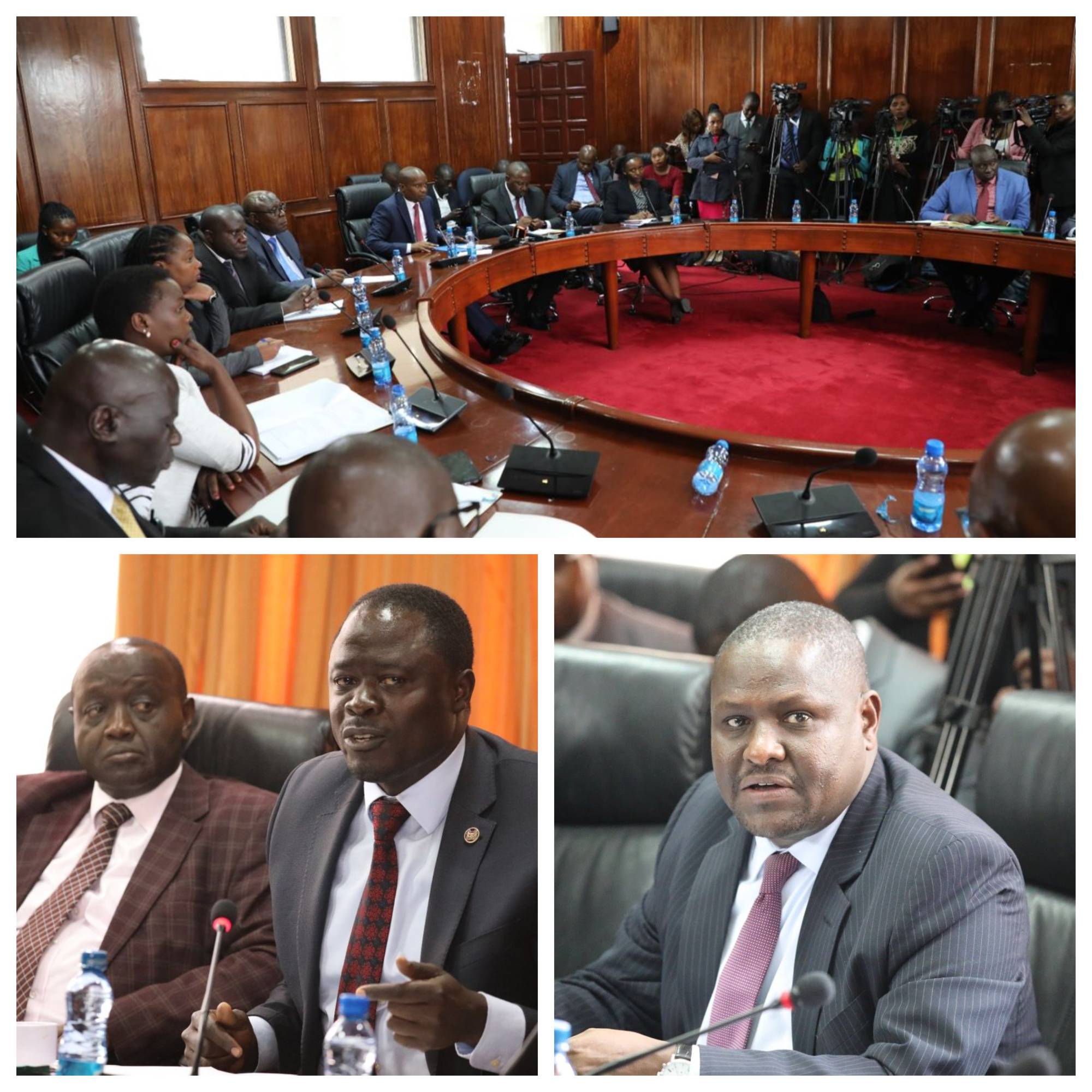𝐒𝐄𝐂𝐔𝐑𝐈𝐓𝐘 𝐂𝐎𝐌𝐌𝐈𝐓𝐓𝐄𝐄 𝐄𝐗𝐏𝐑𝐄𝐒𝐒𝐄𝐒 𝐂𝐎𝐍𝐂𝐄𝐑𝐍 𝐎𝐕𝐄𝐑 𝐏𝐔𝐁𝐋𝐈𝐂 𝐒𝐏𝐀𝐓 𝐁𝐄𝐓𝐖𝐄𝐄𝐍 𝐈𝐍𝐒𝐏𝐄𝐂𝐓𝐎𝐑 𝐆𝐄𝐍𝐄𝐑𝐀𝐋 𝐀𝐍𝐃 𝐍𝐀𝐓𝐈𝐎𝐍𝐀𝐋 𝐏𝐎𝐋𝐈𝐂𝐄 𝐒𝐄𝐑𝐕𝐈𝐂𝐄 𝐂𝐎𝐌𝐌𝐈𝐒𝐒𝐈𝐎𝐍
Members of the Departmental Committee on Administration and Internal Security expressed concern over the recent conflict over mandates between the Inspector-General (IG) of the National Police Service and the National Police Service Commission (NPSC).
Members were speaking when they held a meeting with the Cabinet Secretary for Interior and National Administration Prof. Kithure Kindiki in Parliament.
Concerned over the embarrassment and erosion of public confidence that the spat had caused, the Committee resolved to write to the Attorney General who is the principal advisor to the Government to confirm the disparity of mandates between the two crucial institutions in the security sector.
The Committee further resolved to invite the Cabinet Secretary to shed light on the incident and to apprise the lawmakers on the steps he had taken to alleviate the conflict .
Responding to the Committee’s questions Prof. Kindiki told Members that the conflict had arisen as a result of lack of comprehension of the respective mandate by the two institutions.
He regretted that the matter had degenerated to such extent causing public embarrassment. He went ahead to issue a public apology over the incident and undertook to ensure it not happen again.
"The exchange between the IG and the Chairperson of the NPSC is regrettable and should not have happened. I want to apologize on behalf of the IG and the Chairperson of the NPSC, and promise that this will not happen again”, he told Members.
“Hon. Chair, this kind of conflict is not a new thing. It happened before between the first Chairperson of the NPSC Mr. Johstone Kavundi and the then Inspector General of Police”, he added.
Asked what action he had taken to settle the matter, Prof. Kindiki told the Committee that shortly after the spat, he had called for a meeting between the two in a way of establishing a truce and to promote a collegiate approach towards their operations.
He added that the actions of the two amounted to a breach of Chapter Six of the Constitution, an action that could easily cause their removal from office.
Prof. Kindiki also told the Members that while the spat is attributed to a clash in understanding the respective mandates of the two institutions by their heads, the matter can only be settled by the way of an Advisory from the Attorney General or be subjected to interpretation by the Constitutional courts.
Members led the Chairperson Hon. Gabriel Tongoyo told the CS that he cannot reduce his role to firefighting as he has a role in offering leadership and policy direction, a fact that the CS accepted. They opined that rather than seek redress at the courts, it was better if the CS and the Committee offered an amicable solution.
Committee Members stressed the need for the IG and Commission to work together for the good of the country. They wondered why the conflict had degenerated thus far yet the IG and his two deputies are Members of the Commission. The lawmakers also called for the review of recent promotions and recruitments which had formed the subject of the conflict.
Members and the CS alike hinted that they would in future cause the review of Article 246 of the Constitution, National Police Service Act and other attendant provisions to treat any lacuna in law that may cause future conflicts between the two institutions.
“Mandates are provided for by law. Any recruitments or promotions that are determined outside of the law remain an annullity. There have been complaints of favoritism and nepotism in the recent transfers and promotions which must be reviewed”, Hon. Kaluma noted.
The MPs also sought to be apprised on the security situation in the country.
CS Kindiki told the Committee that his Ministry had managed to contain runaway insecurity due to banditry in the North Rift but was quick to add that the country is not incident free.
He outlined five major priority areas that his Ministry has identified as threats to security in the country. These areas include, the threat of terror, threat of livestock theft and the threat of manufacture and proliferation of illicit liquor and hard drugs. Others include the threat to climate change and the emerging culture of handling grievances in a violent way.
















